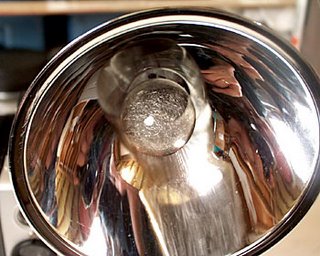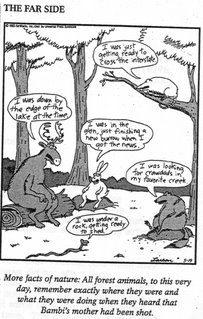
The classic textbook example of a shocking and surprising public event is the assassination of JFK. This is often referred to as the "Shot that rang around the world".
People claimed to remember exactly where they were, what they were doing, and how they found out about the assassination of JFK. They said that their memories were just like photographs.
Brown and Kulick (1977) investigated these claims and identified a special type of memory which they called flashbulb memory.
They argued that a surprising and emotional event activates a special memory mechanism (called the Now Print! mechanism) that acts like a camera to record details of the event.
McCloskey et al (1988)
Surprising, shocking, and emotional events may lead to better memories, flashbulb memories, or worse memory, repression. Psychologists think a key factor is how personally relevant the event is.
Conway et al (1994)
Conway et al investigated the accuracy of students memories for the unexpected resignation of Margret Thatcher as prime minister in 1990. They found that the majority of British students did have accurate and detailed memories of this event.
Link to newsflash: Thatcher resigns.
Newsflash or Flashbulb memory ?
9/11
Weaver (1993)
However, some psychologists think that flashbulb memories are just like ordinary memories. People think they remember the event clearly and accurately but their memories for these events are often inaccurate. They are forgotten over time in the same way as ordinary memories.
Some psychologists argue that the reason people think they remember surprising and shocking public events accurately and permanently is because they talk about them. This could be a form of rehearsal. This may explain the detailed memories that they have.

This cartoon illustrates the principle of flashbulb memories.
The animals remember exactly where they where and what they were doing when they first heard of the death of Bambi’s mother.
However, some psychologists argue that flashbulb memories are different from ordinary memories because they are often rehearsed. People talk about the event a lot and therefore they are remembered more often.
The animals in this cartoon are talking about the first time they found out about the death of Bambi's mother. This may help them to remember.
The evidence suggests that there is no 'Now Print!' mechanism. Flashbulb memories are just ordinary memories.
However, there is evidence that emotional arousal does influence memory formation. Too much emotional arousal and memory formation may be blocked. Some emotional arousal and memory formation may be improved. This may simply be due to physiological arousal.
There is evidence that just chewing gum while learning something improves memory. Heart rate and pulse rate increase when you do something physical and this may improve memory formation and lead to better recall.
There is evidence that stress has a negative impact on memory. When we find ourselves in a stressful situation the body responds by releasing hormones into the blood stream. These hormones speed up some physiological processes and slow down other physiological processes. This is sometimes called the 'fight/flight' response.
One of the hormones released is Cortisol. Cortisol disrupts memory formation. Long term stress leads to higher levels of Cortisol in the brain. This can damage the hippocampus. Damage to the hippocampus is known to affect our ability to form new long term memories - remember H. M.
The link below is to an audiolecture by one of the leading Physiological Psychologists. In this lecture he explains the impact of highly emotional events on memory formation and the negative effects of stress on the brain.
Later in the course we will look in detail at the physiology of stress.
Dr. Robert Sapolsky - "Stress and Memory: Forget It!"
And finally, what do you remember?











No comments:
Post a Comment